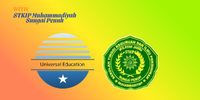Developing Sustainable Technological Pedagogical Content Knowledge (S-TPACK) in Teaching Science
https://doi.org/10.63081/uejtl.v2i3.83
Sustainable TPACK, Science Education, Eco-Friendly Technology Integration, Professional Development, Environmental Stewardship
Abstract
This mixed-methods study introduces the concept of Sustainable Technological Pedagogical Content Knowledge (Sustainable TPACK), extending the TPACK framework with a focus on eco-friendly technology integration in science education. The research aimed to operationalize the Sustainable TPACK framework and explore its application in science teaching contexts. A survey was administered to assess in-service science teachers' self-reported Sustainable TPACK levels, followed by in-depth case studies involving classroom observations, interviews, and document analysis. The findings demonstrated that science teachers generally possessed moderate to high levels of Sustainable TPACK and faced challenges in implementing eco-friendly technology, which could be overcome through collaboration and professional development opportunities. The study highlights the need for targeted initiatives supporting science educators in developing Sustainable TPACK, fostering environmental stewardship among students, and addressing domain-specific challenges. Future research may examine the impact of Sustainable TPACK on student learning outcomes and the effectiveness of various professional development strategies in promoting this framework among science educators.
References
Ballew, M. T., Omoto, A. M., & Winter, P.L. (2015). Using Web 2.0 and Social Media Technologies to Foster Proenvironmental Action. Sustainability, 7, 10620-10648. https://doi.org/10.3390/SU70810620
Cherner, T. S., & Smith, D. W. (2017). Reconceptualizing TPACK to Meet the Needs of Twenty-First-Century Education. The New Educator, 13, 329-349. https://doi.org/10.1080/1547688X.2015.1063744
Fahrurozi, S. K., Budiyanto, C. W., & Roemintoyo, R. (2019). Technological Pedagogical And Content Knowledge (Tpack) For Overcoming Teacher Problems In Vocational Education And Challenges In The 21st Century. Journal of Mechanical Engineering and Vocational Education (JoMEVE), 2(1), 33-40. https://doi.org/10.20961/JOMEVE.V2I1.28676
IPCC. (2022). Climate change 2022: Impacts, adaptation and vulnerability. Contribution of Working Group II to the Sixth Assessment Report of the Intergovernmental Panel on Climate Change [H.-O. Pörtner, D.C. Roberts, M. Tignor, E.S. Poloczanska, K. Mintenbeck, A. Alegría, M. Craig, S. Langsdorf, S. Löschke, V. Möller, A. Okem, B. Rama (eds.)]. Cambridge University Press. https://www.ipcc.ch/report/ar6/wg2/
Koehler, M. J., & Mishra, P. (2009). What is technological pedagogical content knowledge? Contemporary Issues in Technology and Teacher Education, 9(1), 60–70. https://citejournal.org/volume-9/issue-1-09/general/what-is-technological-pedagogicalcontent-knowledge/
Koehler, M.J., Mishra, P., Akcaoglu, M., & Rosenberg, J.M. (2013). The Technological Pedagogical Content Knowledge Framework for Teachers and Teacher Educators. In book: ICT Integrated Teacher Education: A resource book, 2-7.
Latip, A., Robandi, B., Amaliah, A., Khakim, R.R., & Fatonah, N. (2023). Technological Pedagogical Content Knowledge (TPACK) Framework for Science Teachers’ Comptences in Facing Global Challenges and Issues: A Narrative Literature Review. International Journal of Pedagogy and Teacher Education, 7(1), 45-57. https://doi.org/10.20961/ijpte.v0i0.74699
Lotz-Sisitka, H., Wals, A. E., Kronlid, D. O., & McGarry, D. (2015). Transformative, transgressive social learning: Rethinking higher education pedagogy in times of systemic global dysfunction. Current Opinion in Environmental Sustainability, 16, 73–80.
Matherson, L.H., Wilson, E.K., & Wright, V.H. (2014). Need TPACK? Embrace Sustained Professional Development. The Delta Kappa Gamma bulletin, 81(1), 45-52.
Midden, C.J., Kaiser, F.G., & McCalley, L.T. (2007). Technology's four roles in understanding individuals' conservation of natural resources. Journal of Social Issues, 63, 155-174. https://doi.org/10.1111/J.1540-4560.2007.00501.X
Purwianingsih, W., Novidsa, I., & Riandi, R. (2022). Program for Integrating Education for Sustainable Development (ESD) into Prospective Biology Teachers' Technological Pedagogical Content Knowledge (TPACK). Jurnal Pendidikan IPA Indonesia, 11(2), 219-228. https://doi.org/10.15294/jpii.v11i2.34772
Roozafzai, Z. S. (2024a). Teaching English as a Foreign Language and Smarter Learning Environments in the New Age of Digital Transformation. Educational Challenges, 29(1), 135-158. https://doi.org/10.34142/2709-7986.2024.29.1.10
Roozafzai, Z. S. (2024b). The Impact of the Flipped Classroom Method on Learning Outcomes, International Journal of English Learning and Applied Linguistics (IJELAL), 4(2), 173–189. https://doi.org/10.21111/ijelal.v4i2.12055
Roozafzai, Z. S. (2024c). Artificial Intelligence Assistance and Cognitive Abilities: Harnessing AI-Assisted Heuristic Methods for Transitioning from Critical to Creative Thinking in English Language Learning. Educational Challenges, 29(2), 339–361. https://doi.org/10.34142/2709-7986.2024.29.2.23
Roozafzai, Z. S., & Zaeri, Z. (2024a). Leveraging AI-Assisted Graphic Designs to Foster Creative Thinking in English Language Learning. International Journal of Academic Pedagogical Research (IJAPR), 8(9), 31-53. http://ijeais.org/wp-content/uploads/2024/9/abs/IJAPR240906.html
Roozafzai, Z. S., and Zaeri, P. (2024b). Digital Dynamics: Exploring the Intersection of AI, Animation, and Personalized Learning. i-manager’s Journal of Educational Technology, 21(1), 1-10. https://doi.org/10.26634/jet.21.1.20850
Schmidt, D. A., Baran, E., Thompson, A. D., Mishra, P., Koehler, M. J., & Shin, T. S. (2009). Technological Pedagogical Content Knowledge (TPACK): The development and validation of an assessment instrument for preservice teachers. Journal of Research on Technology in Education, 42(2), 123–149. https://doi.org/10.1080/15391523.2009.10782544

Downloads
Published
How to Cite
Issue
Section
License
Copyright (c) 2025 Zahra Sadat Roozafzai

This work is licensed under a Creative Commons Attribution-NonCommercial 4.0 International License.







